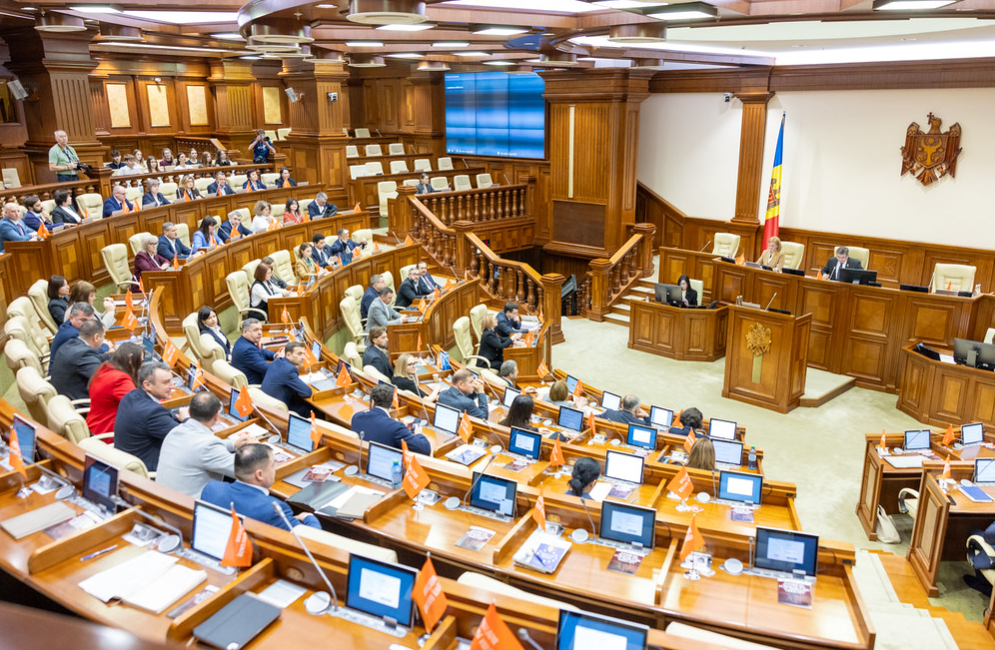
Parliament denounces Agreement on establishment and operation of Russian cultural centers
On 27 November, Parliament adopted in the second reading a draft law denouncing the Agreement between the Government of the Republic of Moldova and the Government of the Russian Federation on establishment and operation of cultural centers. The decision was supported by 56 deputies from the PAS and PDA factions.
Foreign Policy Committee head Doina Gherman mentioned that the project was examined and approved in the first reading during the parliamentary plenary session on 13 November, and in the meantime, no proposals or objections were received from the permanent committees or deputies.
“In the context of the above, based on Article 27 and Article 56 of the Parliament's Regulations, the Foreign Policy Committee proposes the Parliament adopt the current draft law for the second reading,” Gherman stated.
The draft denouncement was developed by the Ministry of Culture, which argued that, in the current geopolitical situation and with the high risk of disinformation, the Agreement with the Russian Federation could be used as a tool to promote distorted narratives, posing a risk to the informational security of the Republic of Moldova.
Furthermore, considering that our country does not have a cultural center on the territory of the Russian Federation, there is no equitable mechanism for promoting information about the Republic of Moldova, undermining the balance and original purpose of the Agreement.
Minister of Culture Cristian Jardan mentioned in the Parliament's plenary that the Agreement was signed in 1998, in Moscow, and came into force in July 2001. Based on the document, the Russian Federation opened the Russian Cultural Center in Chisinau in 2009. Since the Agreement's ratification, the Republic of Moldova has not established a cultural center in the Russian Federation.
“The Russian Cultural Center is under the direct administration of the Russian Federation Embassy in Chisinau and is funded by the Russian agency ‘Rossotrudnichestvo,’ an institution directly subordinate to the Russian presidency. It has been included in international sanctions, being qualified by the EU as ‘the main state agency projecting Kremlin's soft power and hybrid influence, including the promotion of the so-called Russkiy Mir concept,’ the minister stated.
The denouncement of the Agreement was initiated in February 2025, at the request of the Ministry of Foreign Affairs, following a serious breach of Moldova's airspace by Russian drones.
Parliament speaker in Stockholm to meet Moldovans residing in Sweden
Defense minister, EU Ambassador to Moldova discuss current security challenges, bilateral defense cooperation
Moldovan president says Europe's stability depends on fully guaranteeing Ukraine’s independence, sovereignty, security
Japanese Ambassador in Chisinau ends mandate; Moldova's foreign affairs minister says country grateful for Japan's constant support
Participants in PACE meetings discuss combating violence, role of parliaments in implementing Istanbul Convention
Cohesion 2027+ // Deputy PM says Moldova does not come to EU as beneficiary, but as responsible partner
Council of Europe supports Moldova's presidency priorities at Committee of Ministers
Speaker attends PACE Standing Committee Meeting
Public discussions on National Accession Program update
Reception on Romania's National Day in Chisinau: messages of unity and resilience from both sides of Prut River
BTA: Bulgaria to Host Opening, First Three Stages of Giro d'Italia Cycling Race in May 2026
President alongside Speaker and Prime Minister attended reception held on Romania's National Day
President's message at reception organized on Romania's National Day: We must defend historical truth and reclaim our patriotism
Moldovan Embassy in Israel announces suspension of consular services till December 15
Moldova's progress, European expertise discussed with French officials
Over 900 criminal files related to drug trafficking; Moldovan interior minister says ministry proposes draft to tighten penalties for narcotic substances' trafficking
VIDEO // Authorities want registry of parcels, additional raids to combat drug trafficking in Moldova; MP says 99 per cent of drugs come from abroad
PM has meeting with Ambassador of State of Qatar to Moldova
HEARINGS // Resignations, thorough investigations following arms smuggling at Moldovan-Romanian Border; Moldovan MP says it is about international arms trafficking network
French Development Agency to continue funding strategic projects for Moldova
PHOTO GALLERY // Russia's designated Ambassador to Moldova summoned to Foreign Affairs Ministry for explanations after drone crash in Floresti district
National Hotel, other abandoned buildings might be mandatorily secured; Moldovan parliament analyzes new rules for neglected buildings
Moldova to have extended access to UNESCO emergency funds for protection of heritage
EU increases financial support for Moldova in 2026 European budget
VIDEO, PHOTO // Gerbera drone, crashed in Floresti district, displayed outside Moldova's Foreign Affairs Ministry; Agreed Russian ambassador receives another protest note

